Uwe Hermann: Configure Firefox/Iceweasel 3 to be more secure / usable / bearable
Today seems to be Firefox/Iceweasel 3 Bashing Day on Planet Debian, so let me join the fun :)
I agree with most other people that the default Firefox/Iceweasel 3 config is not ideal, so here's what I did to fix it. Some of these items improve performance, some remove annoyances, some remove privacy issues, some remove security issues. Not everything here may be desirable for people other than me.
General
- Disable the bookmarks toolbar via "View / Toolbars / Bookmarks Toolbar", nobody needs that and we save some screen space. Remove all pre-defined bookmarks while we're at it.
- Select "View / Toolbars / Customize".
- Add the "New Tab" button/icon right after the "Home" button. This is probably the most-used button (for me at least) and it's not available per default...
- Click "Use Small Icons", there's no reason to waste screen space.
- Remove the Google search bar (useless).
- Now move all icons and the URL bar into the menu bar (I'm not kidding). After that you can disable the nagivation toolbar via "View / Toolbars / Navigation Toolbar" and save even more screen space.
- Select "When Iceweasel starts: Show a blank page".
- Set "Home Page" to whatever you see fit.
- Enable "Always show the tab bar".
- At the right-hand side of "Enable JavaScript" click "Advanced" and uncheck all checkboxes. JavaScript stuff shouldn't need to do any of those operations.
- Uncheck "Enable Java". Nobody needs this crap and it's a huge security risk.
- Disable "Keep my history for xyz days" completely. Huge privacy risks.
- Disable "Remember what I enter in forms and the search bar". Huge security and privacy risks, almost no gain.
- Disable "Remember what I've downloaded". Huge privacy risks.
- Uncheck "Accept third-party cookies".
- Choose "Keep until: I close Iceweasel".
- Click "Show Cookies" and remove all of them.
- Enable "Always clear my private data when I close Iceweasel". Click "Settings" and check all items. You want to purge everything when closing Iceweasel.
- On the right-hand side of "Warn me when sites try to install add-ons" click "Exceptions" and remove all exceptions.
- Disable "Tell me if the site I'm visiting is a suspected attack site". Useless crap, possibly a privacy issue.
- Disable "Tell me if the site I'm visiting is a suspected forgery". Useless crap, possibly a privacy issue.
- Disable "Remember passwords for sites". This is a huge security risk, never ever enable it!
-
"General" tab:
- Enable "Warn me when web sites try to redirect or reload the page".
- Disable "Check my spelling as I type". Useless, annoying crap, which probably even impacts performance.
-
"Update" tab:
- Disable "Automatically check for updates to: Installed Add-ons".
- Disable "Automatically check for updates to: Search Engines".
- Select "When updates to Iceweasel are found: Ask me what I want to do".
- Set
browser.urlbar.matchOnlyTyped = trueto disable the new, annoying "AwesomeBar" URL bar feature (which is also a huge privacy risk). - Browser tabs are way too huge for my taste (thus only very few fit on the screen). Fix it with
browser.tabs.tabMinWidth = 60andbrowser.tabs.tabMaxWidth = 60(needs a browser restart). You can even use less than60if you don't need any text and an icon per tab is enough for you. - Disable the annoying, flashing auto-search stuff when you select "Tools / Add-ons / Get Add-ons": Set
extentions.getAddons.showPane = false. - Set
bidi.support = 0. You'll probably never need it, so reduce the number of potential bugs and security issues by disabling it. - Self-signed certificate handling is annoying, so fix it with:
browser.ssl_override_behavior = 2andbrowser.xul.error_pages.expert_bad_cert = true(thanks Pierre Habouzit). - Set
browser.tabs.closeButtons = 3in order to prevent accidental closing of tabs (no more Close buttons on each tab, only one global Close button on the right). Yes,CTRL+Shift+Thelps in case it still happens. - Set
network.prefetch-next = falseto prevent random prefetching of webpages which means wasting CPU cycles and bandwidth, as well as subtle privacy and security issues.
-
about:config
 Open a new tab, enter "about:config" as URL and hit ENTER. Click the annoying "I'll be careful, I promise!" button. Uncheck "Show this warning next time" while we're at it.
Open a new tab, enter "about:config" as URL and hit ENTER. Click the annoying "I'll be careful, I promise!" button. Uncheck "Show this warning next time" while we're at it.
 As last Wednesday was the second anniversary of me joining Google, I thought
it an opportune time to reflect on how I've found learning
As last Wednesday was the second anniversary of me joining Google, I thought
it an opportune time to reflect on how I've found learning  One of the big mental hurdles with testing is knowing how many tests you should aim for. You can't prove a negative: even if your tests are all passing it still doesn't tell you much about the tests you haven't written that might fail! We use
One of the big mental hurdles with testing is knowing how many tests you should aim for. You can't prove a negative: even if your tests are all passing it still doesn't tell you much about the tests you haven't written that might fail! We use 